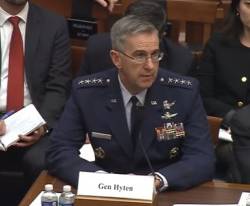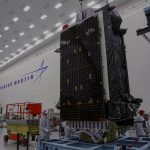Gen. John E. Hyten, an officer deeply familiar with the GPS program whose testimony before Congress underscored the need to protect satellite navigation frequencies, was confirmed Thursday by the Senate to be vice chairman of the Joint Chiefs of Staff and the nation’s second highest ranking military officer.
Hyten led Air Force Space Command before becoming commander of U.S. Strategic Command. He steps into his new role just as the Department of Defense launches U.S. Space Command and reorganizes its approach to military space to meet threats posed by near-peer adversaries. Allegations of sexual misconduct delayed the confirmation for a time though a military investigation found insufficient evidence to support charges.
Hyten has served in space-related posts since 1994 and was often seen on Capitol Hill. During testimony before the House Subcommittee on Strategic Forces in 2016 he spoke about a proposal by Ligado Networks to allow satellite frequencies to be used to also support a terrestrial network. Tests have shown that such a network has the potential to interfere with satellite navigation receivers.
“You may recall that your predecessor Gen. (William) Shelton testified pretty much from where you’re sitting right now,” said then-subcommittee Chairman Mike Rogers (R-Alabama). “[He] warned that a proposal under consideration by the FCC would have created extensive, harmful interference to GPS.”
Hyten said he had yet to see information showing that changes Ligado had made to its proposal were enough to make it workable.
“I’ve heard that Ligado has put forth a new proposal to use that spectrum, but I’ll tell you Congressmen I have seen no data that supports the use of the frequency spectrum other than the data I saw in 2011,” Hyten said. “So, the position of Air Force Space Command is the same as it was when Gen. Shelton sat in that seat. I don’t think that we should infringe on the GPS spectrum. That’s a critical capability not just for the military security of the nation but for the entire economic well-being of this nation. We can’t allow that to happen.”
Hyten told lawmakers the Air Force was supporting the GPS Adjacent Band Compatibility Assessment being conducted by the Department of Transportation that, at that time, was set to start testing. The assessment mapped out the limits on emissions needed to protect GPS users.
“We’re trying to be good partners as we work at that,” Hyten told the subcommittee, “but the partnership has to be based on real testing, real impacts and what the impacts to national security are. We cannot do something that will infringe on our national security. Period.”






